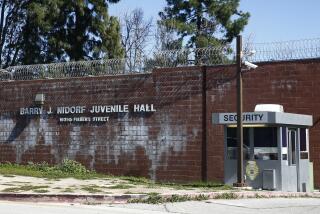U.S. Mulls Relocating Abu Ghraib Detainees
CAMP BUCCA, Iraq — U.S. military commanders in Iraq have proposed abandoning the infamous Abu Ghraib prison and shifting most of its inmates to this rapidly expanding detention camp near the Kuwaiti border.
Bucca, which already holds 5,000 detainees, would become the hub of the military-run prison system in Iraq. Army Maj. Gen. William H. Brandenburg, the new commander of detainee operations in Iraq, has endorsed the plan, which must be approved by Army Gen. George W. Casey, commander of the U.S.-led multinational force in Iraq.
Last year, President Bush vowed to demolish Abu Ghraib in the wake of an abuse scandal, but Brandenburg said his own objections to the prison were largely functional.
“It’s an expensive place to run,” he said during a tour of this remote facility. “We could spend a zillion dollars there and still not get it fixed up.” The Iraqi Justice Ministry has begun housing convicted criminals in Abu Ghraib and is expected to continue using it.
If the plan is approved, as expected, it would close perhaps the most troubled chapter of the 21-month U.S. presence here. The emergence last spring of photographs and video showing abuse and humiliation of prisoners by American guards was a turning point in the U.S.-led occupation and dealt a lasting blow to efforts to win the trust of the Iraqi people.
For many Iraqis, the images of U.S. troops smiling over naked, terrified Iraqi men in the prison outside Baghdad were proof of the true nature of the occupation.
During his early-January visit to Camp Bucca, Brandenburg told a group of newly arrived guards that Abu Ghraib was “a dark day for all of us.... My expectation from every one of you is that these detainees be treated with respect.”
In April, Army Maj. Gen. Geoffrey D. Miller was brought in to oversee reform of the detention system, and he recommended that the U.S. leave Abu Ghraib.
Miller left in December, but Brandenburg has endorsed his predecessor’s plan.
Given Bucca’s remote location at the southern tip of the country, Brandenburg estimates that he still needs the capacity to hold as many as 2,000 prisoners in the Baghdad area.
Final approval on the Abu Ghraib departure may be largely contingent on figuring out a satisfactory alternative. One possibility is to expand the Camp Cropper facility near Baghdad’s international airport, which houses “high value” prisoners such as deposed dictator Saddam Hussein and his top lieutenants.
Abu Ghraib holds more than 2,000 U.S. prisoners, and Camp Bucca is expanding its capacity to hold up to 6,000.
Brandenburg said it was “prudent not to stir the pot” in the weeks before the vote. But in the spring, once the election is past, he hopes to empty Abu Ghraib of U.S.-held prisoners.
That process has been hindered in recent months by the influx of new detainees captured during increased offensive operations.
Before his departure, Miller estimated that the November siege of Fallouja alone had produced 2,500 prisoners.
Those detainees are gradually being interrogated and assessed. Prisoners judged to have intelligence value or pose a threat are being transferred to Camp Bucca. The rest will be released.
The Army has already conducted a pair of releases this year, most recently for more than 200 prisoners Jan. 9.
More to Read
Sign up for Essential California
The most important California stories and recommendations in your inbox every morning.
You may occasionally receive promotional content from the Los Angeles Times.










